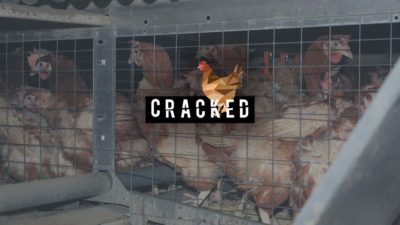Interview: A Life of Activism with Viva! Founder and Director, Juliet Gellatley


Viva! have done many revealing undercover investigations into the animal agriculture industry in the UK. In the United States attempts have been made to pass ag-gag laws making it illegal to undercover film animal agriculture. Clearly industrial farming is running scared.
Do you lobbyists and the animal agriculture industry looking to do the same here?
Ag-gag laws are whistle-blower suppression laws; they aggressively criminalise first hand documenting and/or reporting of the day-to-day activities of factory farms, while doing nothing to stop the abuse. It is extremely concerning that the UK will attempt a similar attack on freedom of speech. For Viva! and the animals it would be exceptionally bad news. Viva! investigates the reality of farming and slaughter – and it’s often the big names who are the worst offenders.
If farmers have nothing to hide, why do they fear being filmed? Tragically, the industrialised nations have created a system in which standard factory-farming practices are diabolically cruel. I feel though, that the tide is slowly turning – there will come a point when factory farming collapses in a miserable heap, to be swept away by a more knowing, caring, wise global society.
What would your advice be to aspiring animal rights activists? How can their campaigns have the biggest impact possible?
Use your talents, imagination, plan and be bold. Don’t be afraid to ask others for help because if they say no, you’re no worse off but they may well say yes. Campaigning is about persuading people to change – so it means engaging with them. Decide who you want to influence, with what message and then do what is right for you – and that audience. Put yourself in their shoes – how will they feel when they see your message? And when they see it, what do you want them to do? (Eg if it is to go vegan you could tell them about free help at: www.viva.org.uk/30dayvegan
It can help joining in with Viva!’s campaigns – so you meet likeminded people; strengthen the campaign (unity is power); and you get used to campaigning. Viva! has always relied on its supporters – we are our supporters! Two examples:
1. Viva! investigated foie gras production (ducks are force fed grain until their liver is ten times its natural size and then killed for their fatty liver) – activists use our footage to show restaurateurs and ask them to stop selling foie gras. If this doesn’t work they use their imagination to campaign locally against that restaurant. Viva! supporters and activists have persuaded about 1,000 restaurants to pull foie gras. And on a national level, Viva! persuaded Amazon and famous chefs to withdraw, resulting in global media coverage.
2. Tesco sold kangaroo meat in about 700 stores. It was only by activists joining our Days of Action on a local level, that Tesco withdrew all kangaroo meat. It took determination and persistence. Not one Day of Action – several. (That involved photo calls and colourful demos outside about 200 stores on the same days.)
My other bit of advice – don’t give up!
 What would be your advice to mothers who want to raise their children Vegan or Vegetarian but face hostility from friends and family?
What would be your advice to mothers who want to raise their children Vegan or Vegetarian but face hostility from friends and family?
Arm yourself. I have twin boys and found any criticism evaporated as soon as people realised I knew my stuff! A great starting point for pregnancy and weaning is our Mother & Baby Guide – http://www.viva.org.uk/resources/campaign-materials/guides/vegetarian-and-vegan-mother-and-baby-guide
And for veggie and vegan kids 0-16 years, see
http://www.viva.org.uk/resources/campaign-materials/guide/healthy-veggie-kids
It’s a funny thing, but people who know nothing about nutrition suddenly become experts when you have children! Stay calm; explain to them that a varied vegan diet is ideal for children and adults because it is packed with disease busting, body and brain nurturing nutrients. Just as importantly, a vegan diet particularly lacks the nasties you want your child to avoid – saturated fats, cholesterol, concentrated pesticides, cancer promoters, dioxins and mercury. The latter two are in practically all fish.
And few people realise that cows’ milk contains 35 hormones and 11 growth factors, including those linked to breast and prostate cancers.
Also, never be defensive. You don’t need to be. The government’s National Diet and Nutrition survey shows what most children in the UK eat and it’s not good. A third are overweight or obese. A third don’t have a daily bowel movement. Calories, animal protein, salt and saturated animal fats too high from red and white meats, burgers, kebabs and sausages. In fact, over 90 per cent eat too much saturated fat. And over half of children consume more than the recommended amount of salt. So take heart in your child’s healthy vegan diet!
We believe Veganism is capturing the cultural zeitgeist now. What has accelerated this interest in Veganism in your eyes?
There seem to be basic principles involved in all major non-violent social change. Steps to effecting change include gathering information; education; taking direct action; negotiation and reconciliation. Viva! has been deeply immersed in all these steps for 21 years and so have many others. It is can seem like a massive struggle to create the ripples needed to form the waves of change. But there comes a tipping point. And that starts to happen when ‘ordinary’ people realise that change is not a threat, but essential and positive. We are getting to that point.
The information is overwhelming. Animals are treated abysmally and have their lives taken needlessly. The planet is being assaulted. And chronic illness has never been higher. Social media has assisted with global education and direct action on all of these issues. Also the situation is becoming so dire that urgency is kicking in.
In terms of negotiation, in our case this has meant food manufacturers, supermarkets and restaurateurs, for example, providing a profusion of vegan options compared to 20 years ago. So, on the one hand we have provided the information, education and action and on the other we and many others are making it easy for people to change.
A major obstacle to social change is when people feel the problems are ‘too big’ and rely on others to find the solutions. With veganism we have certainly exposed that the issues facing us are mammoth but that the answer is within each and every one of us. We all make a choice of whether to destroy animals, the planet and our health, each time we food shop. People are realising that they cannot blame cruelty, destruction and sometimes their own ill health on others. We are increasingly taking responsibility for our actions.
Change is happening because we are getting to the point where ‘ordinary’ people realise that the vegan movement is about compassion, wisdom and taking back power from greedy, murderous governments and multinationals. It is about the very survival of our planet.
What is your favourite on the go snack?
Bananas
What Vegan musician would you most like to see perform?
Not a musician but I’d like to see him perform! Tim Shieff.
What gives you hope for the future?
The gargantuan shift in attitude towards veganism in the last 20 years. This is just the beginning. The tide is turning.




